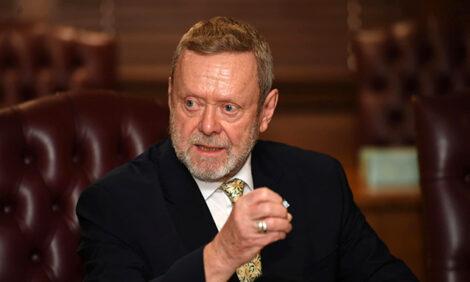News / National
UK Minister backs Zimbabwe's Commonwealth re-entry bid
7 hrs ago | Views

United Kingdom Minister for Africa, Lord Collins of Highbury, has welcomed Zimbabwe's ongoing efforts to rejoin the Commonwealth, commending the government's willingness to engage in reforms and dialogue aimed at strengthening democratic governance and human rights.
Speaking at a press briefing held in Harare during celebrations to mark King Charles III's birthday, Lord Collins expressed optimism about Zimbabwe's reintegration into the international body, while underlining that readmission would be contingent on adherence to Commonwealth values.
"I very much welcome Zimbabwe's application to re-join the Commonwealth. I was very sad when it left," he said.
"It is not a decision for one country, it's a decision for the Commonwealth itself. I am very hopeful that the independent assessment as part of that process will continue, but it is up to Zimbabwe to continue its application or to reapply."
Zimbabwe withdrew from the Commonwealth in 2003, following the group's decision to maintain the country's suspension over allegations of human rights violations and electoral malpractice under then-President Robert Mugabe.
Lord Collins emphasised that governance reforms and respect for human rights remained central to the UK's position, aligning with broader Commonwealth standards. He welcomed Zimbabwe's participation in the arrears clearance dialogue, which he said was a promising sign of engagement and future collaboration.
"I believe the conditions for a strong partnership focused on economic growth are what will deliver for both the people of Zimbabwe and the people of the United Kingdom," he noted.
The UK envoy stressed that economic growth can serve as a powerful catalyst for social transformation, particularly in empowering women and enhancing civil liberties.
"One of the most important ingredients of a healthy democracy is a vibrant civil society," Lord Collins said, expressing concern over legislation that may curtail civic freedoms.
"I think we are living in a geopolitical world where many of the rights that we have taken for granted are being rolled back - particularly health and women's rights. That is why dialogue around civil society's role is so vital."
Lord Collins reiterated Britain's willingness to support Zimbabwe's development efforts, but cautioned that respect for the rule of law and protection of civil liberties were essential for long-term investment and bilateral growth.
"Rule of law is a prerequisite of development and inward investment. Businesses need to feel secure," he said.
"I don't see human rights in isolation - they are directly connected to economic empowerment. Our partnership must be built on both."
The Minister noted that discussions with President Emmerson Mnangagwa reflected a mutual aspiration for economic development and international reintegration.
"His Excellency understands the importance of economic growth and the enablers that come with it - including governance and the rule of law. That shared commitment gives me hope for a strong future relationship between our two countries."
As Zimbabwe continues its bid to rejoin the Commonwealth, the UK's message remains clear: the door is open, but reforms must be real and consistent with the democratic ideals that underpin the grouping.
Lord Collins concluded by reaffirming Britain's readiness to support Zimbabwe's transformation, pledging constructive engagement that balances economic cooperation with democratic principles.
Speaking at a press briefing held in Harare during celebrations to mark King Charles III's birthday, Lord Collins expressed optimism about Zimbabwe's reintegration into the international body, while underlining that readmission would be contingent on adherence to Commonwealth values.
"I very much welcome Zimbabwe's application to re-join the Commonwealth. I was very sad when it left," he said.
"It is not a decision for one country, it's a decision for the Commonwealth itself. I am very hopeful that the independent assessment as part of that process will continue, but it is up to Zimbabwe to continue its application or to reapply."
Zimbabwe withdrew from the Commonwealth in 2003, following the group's decision to maintain the country's suspension over allegations of human rights violations and electoral malpractice under then-President Robert Mugabe.
Lord Collins emphasised that governance reforms and respect for human rights remained central to the UK's position, aligning with broader Commonwealth standards. He welcomed Zimbabwe's participation in the arrears clearance dialogue, which he said was a promising sign of engagement and future collaboration.
"I believe the conditions for a strong partnership focused on economic growth are what will deliver for both the people of Zimbabwe and the people of the United Kingdom," he noted.
The UK envoy stressed that economic growth can serve as a powerful catalyst for social transformation, particularly in empowering women and enhancing civil liberties.
"I think we are living in a geopolitical world where many of the rights that we have taken for granted are being rolled back - particularly health and women's rights. That is why dialogue around civil society's role is so vital."
Lord Collins reiterated Britain's willingness to support Zimbabwe's development efforts, but cautioned that respect for the rule of law and protection of civil liberties were essential for long-term investment and bilateral growth.
"Rule of law is a prerequisite of development and inward investment. Businesses need to feel secure," he said.
"I don't see human rights in isolation - they are directly connected to economic empowerment. Our partnership must be built on both."
The Minister noted that discussions with President Emmerson Mnangagwa reflected a mutual aspiration for economic development and international reintegration.
"His Excellency understands the importance of economic growth and the enablers that come with it - including governance and the rule of law. That shared commitment gives me hope for a strong future relationship between our two countries."
As Zimbabwe continues its bid to rejoin the Commonwealth, the UK's message remains clear: the door is open, but reforms must be real and consistent with the democratic ideals that underpin the grouping.
Lord Collins concluded by reaffirming Britain's readiness to support Zimbabwe's transformation, pledging constructive engagement that balances economic cooperation with democratic principles.
Source - NewsDay







































